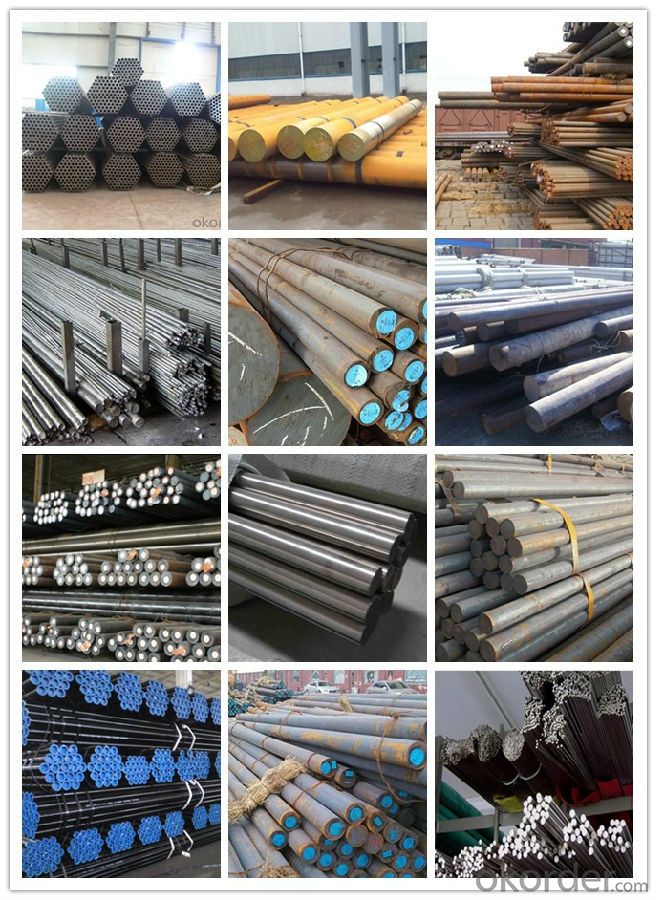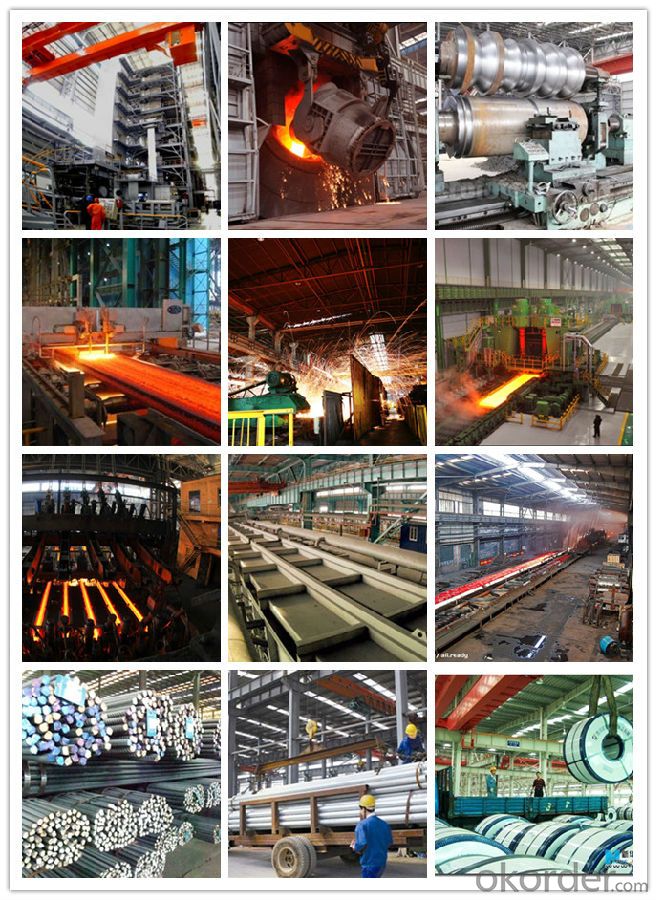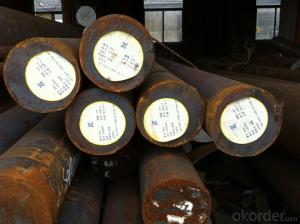1.2738 Mound Steel,China Steel,Steel Mould
- Loading Port:
- China main port
- Payment Terms:
- TT or LC
- Min Order Qty:
- 25 m.t.
- Supply Capability:
- 10000 m.t./month
OKorder Service Pledge
OKorder Financial Service
You Might Also Like
Item specifice
Product information:
Grade | C | Si | Mn | P | S | Cr | Mo | V |
P20 | 0.28~0.40 | 0.20~0.80 | 0.60~1.00 | ≤0.030 | ≤0.030 | 1.40~2.00 | 0.30~0.55 | --- |
1.2311 | 0.35~0.45 | 0.20~0.40 | 1.30~1.60 | ≤0.035 | ≤0.035 | 1.80~2.10 | 0.15~0.25 | --- |
3Cr2Mo | 0.28~0.40 | 0.20~0.80 | 0.60~1.00 | ≤0.030 | ≤0.030 | 1.40~2.00 | 0.30~0.55 | --- |
Applications of mould steel material
mould steel tool steel is ideally suited for the production of plastic moulds. Typical applications include die holders, zinc die casting dies, backers, bolsters and injection moulds. The versatility of mould steel tool steel with its high tensile characteristics enables uses for a variety of other applications such as shafts, rails and wear strips
Forging of mould steel material
Heat slowly, allowing sufficient time for the steel to become heated through. Begin forging at 1050°C. Do not forge below 930°C reheating if necessary. After forging, cool very slowly.
Annealing of mould steel material
Heat uniformly to 770-790°C. Soak well, cool slowly in the furnace.
Stress Relieving of mould steel material
When dies are heavily machined, we recommend stabilising just before finish machining in order to relieve machining strains. Heat to 460-500°C. Soak well and allow to cool in the air.
Hardening of mould steel material
Heat the steel uniformly to 820-840°C until heated through. Quench in oil.
Product show

Workshop show

- Q:How does special steel perform in electrical conductivity applications?
- Special steel, also known as stainless steel, offers excellent electrical conductivity properties in various applications. It is widely used in electrical engineering and electronics due to its high corrosion resistance and low electrical resistance. The addition of specific alloys such as chromium and nickel enhances its conductivity, making it an ideal choice for conducting electricity efficiently. In electrical conductivity applications, special steel exhibits low resistivity, allowing for the smooth flow of electrical current without significant loss of energy. Its low resistance minimizes the generation of heat, which is crucial for preventing overheating and ensuring the efficient operation of electrical components. Special steel also possesses excellent magnetic properties, making it suitable for applications that require both electrical conductivity and magnetic strength. This property is particularly useful in the production of transformers, motors, and generators. Moreover, special steel is highly durable and can withstand harsh environmental conditions, making it suitable for outdoor applications. Its corrosion resistance prevents the formation of rust, ensuring a long lifespan and consistent performance even in challenging environments. In summary, special steel is an excellent choice for electrical conductivity applications due to its low electrical resistance, high corrosion resistance, and exceptional durability. Its unique properties make it a preferred material in various industries that rely on efficient and reliable electrical conductivity.
- Q:How does stainless steel contribute to the production of medical implants?
- Stainless steel contributes to the production of medical implants primarily due to its exceptional properties such as corrosion resistance, high strength, biocompatibility, and ease of sterilization. These qualities make stainless steel an ideal material for manufacturing various medical implants like joint replacements, bone plates, screws, and dental implants.
- Q:What are the different methods of surface powder coating for special steel?
- Some different methods of surface powder coating for special steel include electrostatic spraying, fluidized bed coating, and flame spraying. Electrostatic spraying involves applying a charged powder to the steel surface, which is then cured in an oven. Fluidized bed coating involves dipping the steel into a bed of powder that is heated to a fluidized state, allowing the powder to adhere to the surface. Flame spraying uses a flame to melt and propel the powder onto the steel surface, creating a durable coating.
- Q:How does special steel contribute to the electrical resistance of products?
- Special steel can contribute to the electrical resistance of products in several ways. Firstly, the composition of special steel can be tailored to have specific electrical properties, such as resistivity. By selecting the appropriate alloys and adjusting the carbon content, special steel can be made to have higher resistivity than regular steel or other materials. This higher resistivity is beneficial in applications where electrical conductivity needs to be limited. For example, in electrical wiring, the use of special steel with higher resistivity can help to prevent excessive current flow, reducing the risk of overheating and potential electrical hazards. Similarly, in electrical resistors, the use of special steel can provide the desired level of resistance to control the flow of current and dissipate energy in a controlled manner. Special steel can also contribute to electrical resistance through its physical properties. The microstructure of special steel can be engineered to enhance resistance to electrical current flow. For instance, the addition of certain alloying elements or heat treatment processes can create a fine-grained structure or introduce barriers to electron movement, increasing the overall resistance. Furthermore, special steel can be used in the production of electrical contact materials. These materials need to have specific electrical and mechanical properties to ensure reliable and efficient electrical connections. Special steel alloys can provide high electrical conductivity while also being resistant to corrosion, wear, and deformation, thus contributing to the overall electrical resistance of the product. In summary, special steel contributes to the electrical resistance of products through its tailored composition, which can provide higher resistivity than regular steel. Additionally, the microstructure of special steel can be engineered to enhance resistance to electrical current flow. Whether it is used for limiting current flow, controlling resistance, or creating reliable electrical contacts, special steel plays a crucial role in various electrical applications.
- Q:Can special steel be used in the food processing industry?
- Yes, special steel can be used in the food processing industry. Special steel, such as stainless steel, is commonly used in food processing equipment and utensils due to its corrosion resistance, durability, and ability to maintain hygiene standards. It is suitable for applications that require frequent cleaning, exposure to moisture, and contact with food, ensuring the safety and quality of food processing operations.
- Q:How does spring steel maintain its elasticity?
- Spring steel maintains its elasticity due to its unique composition and manufacturing process. It is made from a high carbon steel alloy that undergoes heat treatment and quenching, which gives it its exceptional strength and flexibility. This heat treatment process called tempering allows the steel to retain its shape and bounce back to its original form after being deformed or subjected to external forces. The carbon content in spring steel also contributes to its elasticity by providing increased hardness and resistance to deformation. Overall, the combination of high carbon content, heat treatment, and quenching make spring steel highly durable and able to maintain its elasticity over extended periods of use.
- Q:How does special steel perform in erosion applications?
- Special steel is known for its exceptional performance in erosion applications. Its unique properties such as high hardness, corrosion resistance, and wear resistance make it highly suitable for environments where erosion is a common issue. Erosion is the gradual wearing away of a material due to the action of external forces such as abrasion, impact, or cavitation. In applications where erosion is prevalent, such as mining, oil and gas, and chemical processing industries, regular steel may not be able to withstand the harsh conditions and may quickly deteriorate. Special steel, on the other hand, is specifically designed to withstand erosive forces and maintain its structural integrity over an extended period. Its high hardness helps it resist abrasion and prevents the material from wearing down quickly. This makes it ideal for applications involving the movement of abrasive materials or fluids. Furthermore, special steel also exhibits excellent corrosion resistance, which is crucial in erosive environments. It can resist the corrosive effects of chemicals, moisture, and other harsh substances, ensuring the material's longevity and performance. In addition to hardness and corrosion resistance, special steel also offers exceptional wear resistance. It can withstand repeated impacts, high pressures, and sliding contact without significant damage, making it highly effective in erosion-prone applications. This wear resistance helps to minimize downtime and maintenance costs associated with material replacement or repair. Overall, special steel's properties make it a reliable and durable choice for erosion applications. Its ability to resist abrasion, corrosion, and wear ensures that it can withstand the demanding conditions often found in such environments, providing long-lasting performance and reducing the need for frequent replacements.
- Q:How is special steel used in the power generation industry?
- Special steel is widely used in the power generation industry for various applications. It is utilized in the manufacturing of turbines, boilers, and other critical components due to its exceptional strength, heat resistance, and corrosion resistance properties. Special steel is crucial in ensuring the efficiency and reliability of power plants, enabling them to withstand high temperatures and pressures, while also minimizing downtime and maintenance costs.
- Q:What are the different methods of surface texturing for special steel?
- There are several different methods of surface texturing for special steel, each with its own unique advantages and applications. Some of the most common methods include: 1. Shot blasting: This process involves propelling small metal or ceramic particles at high speeds onto the surface of the steel. It removes any impurities or contaminants on the surface, creating a textured finish that improves adhesion for coatings and paints. 2. Acid etching: This method involves immersing the steel in an acidic solution, which selectively removes a thin layer of the surface to create a textured pattern. Acid etching can be used to achieve intricate designs or patterns on the steel surface. 3. Mechanical grinding: This technique involves using abrasive tools to physically grind and remove material from the surface of the steel. It can be used to create a range of textures, from smooth to rough, depending on the grit size of the grinding tool. 4. Laser texturing: This advanced method uses laser technology to create precise and intricate patterns on the surface of the steel. Laser texturing offers high precision and repeatability and can be used to achieve complex designs that are difficult to achieve with other methods. 5. Electrochemical etching: This process involves using an electric current to selectively dissolve the surface of the steel, creating a textured pattern. It can be used to achieve consistent and controlled textures on the steel surface. Each method of surface texturing has its own advantages and limitations, and the choice of method depends on the desired texture, the specific properties of the special steel, and the intended application.
- Q:How is special steel used in the aerospace sector?
- The aerospace sector heavily relies on special steel due to its distinctive properties, which make it suitable for various applications. One primary application in the aerospace industry involves using special steel to manufacture aircraft engine components. Turbine blades, shafts, and casings, which are exposed to extreme temperatures, pressures, and stresses, benefit from special steel's exceptional heat resistance, high strength, and superior mechanical properties. These qualities enable the engine parts to endure harsh conditions, ensuring optimal performance and safety. Special steel is also used in constructing aircraft structures like wings, fuselage, landing gears, and critical components. These structures must be lightweight yet strong enough to withstand flight forces. Special steel alloys, particularly stainless steel, strike a balance by providing excellent strength-to-weight ratios and corrosion resistance. Furthermore, aerospace fasteners, including bolts, nuts, and screws, rely on special steel's exceptional strength and durability to maintain the aircraft's structural integrity. Titanium alloys, known for their lightweight nature, high strength, and corrosion resistance, are frequently employed for this purpose. Additionally, special steel finds application in aerospace tooling and equipment production. Molds, dies, jigs, and fixtures used during manufacturing processes require materials that are robust, wear-resistant, and capable of withstanding high temperatures and pressures. Special steel, with its outstanding hardness, toughness, and heat resistance, proves to be ideal for these applications. In conclusion, special steel is indispensable in the aerospace sector as it provides the necessary properties for aircraft engine components, structures, fasteners, and tooling. Its unique characteristics, including high strength, heat resistance, lightweight, and corrosion resistance, contribute to the production of reliable and high-performance aerospace systems.
1. Manufacturer Overview |
|
|---|---|
| Location | |
| Year Established | |
| Annual Output Value | |
| Main Markets | |
| Company Certifications | |
2. Manufacturer Certificates |
|
|---|---|
| a) Certification Name | |
| Range | |
| Reference | |
| Validity Period | |
3. Manufacturer Capability |
|
|---|---|
| a)Trade Capacity | |
| Nearest Port | |
| Export Percentage | |
| No.of Employees in Trade Department | |
| Language Spoken: | |
| b)Factory Information | |
| Factory Size: | |
| No. of Production Lines | |
| Contract Manufacturing | |
| Product Price Range | |
Send your message to us
1.2738 Mound Steel,China Steel,Steel Mould
- Loading Port:
- China main port
- Payment Terms:
- TT or LC
- Min Order Qty:
- 25 m.t.
- Supply Capability:
- 10000 m.t./month
OKorder Service Pledge
OKorder Financial Service
Similar products
New products
Hot products
Related keywords































